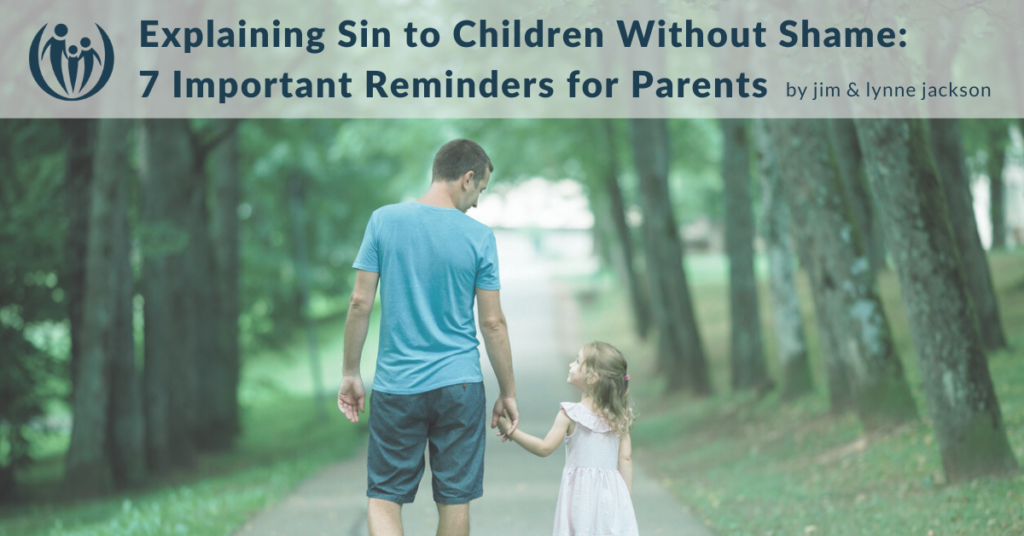
Explaining Sin to Children Without Shame: 7 Important Reminders for Parents

How do you talk to your kids about sin? Many people are hesitant to use the word “sin” as it often carries connotations of self-righteousness, judgment, and shame in today’s culture. Many people believe that right and wrong are decided by what is true and what is right for each person. This makes it hard to explain sin to a child who hears frequent messages of “It’s all good. Just figure out what’s right for you.”
And, yet, some of you may have also grown up in a world that abused this term, overusing it and labeling all dissent from authority or every little negative emotion as sin.
So how do you explain sin to a child? As followers of Jesus, we don’t want to fall into either trap: ignoring the reality of sin or labeling any activity as sin in the absence of the real power of God’s grace and forgiveness.
How do you explain sin to a child?
This is a fantastic question and one we have heard more than once over the years! Sin matters. Grace matters, too. Suppose we are to raise a generation of kids who understand the greatness of God’s love and grace. In that case, we must also raise them to understand the gravity of the sinful human condition and the importance of repentance on the way to living out God’s purposes. Our answer has many parts, and we hope you’ll read all the way through.
7 Reminders for Parents Explaining Sin to a Child
1. Proactively embrace and teach a theology of sin, grace, and forgiveness.
Let’s admit it. We often don’t take sin seriously. The main reason kids don’t understand sin is that parents don’t usually talk about it as if it is the central and serious problem that affects everyone.
Let’s be clear. While it is true that we are all created in God‘s image, it is also true that we are born into the infection of sin. God hates sin. Most of us hate sin, too. It creates a disconnection in our relationship with God, ourselves, and others. It’s just that we tend to hate the sins of others more than we hate our own. Perhaps we point our fingers at the misdeeds of others, or even our kids, but we don’t often do the work to self-examine and confess our sins to God and our families.
In our home, we took sin seriously but NOT by dwelling on it in the middle of corrective efforts. We aimed first to bring God’s grace to light.
What we came to realize is that the starting place for teaching kids about sin was not about a lesson plan or about calling out their sin in real time, but about becoming more attentive to the problem of sin in the place we can most accurately assess it, namely, in ourselves. We came to understand that to receive the fullness of God’s love and grace for us, we must receive it in light of our own flawed and sinful humanity.
Ephesians 2:4-5 tells us, “God, who is rich in mercy, made us alive with Christ even when we were dead in our sin,” and saved us by his grace. Deeply receiving this powerful truth equips us to share this “Good News” (the Gospel) with our kids.
So let’s start there: a brief journey through a basic understanding of sin and grace and some ideas about how to have the conversation about it with the children in your care.
What is sin? Explanations for a child (and their grownups)
The big problem: Sin causes disconnection from God. The Bible is clear that everyone has sinned and falls short of God’s standard. Without God’s free gift of grace, we will remain disconnected from God forever. (See Romans 3:23 and Romans 6:23)
What exactly is sin? The word most frequently used for sin in the New Testament means “missing the mark; hence: (a) guilt, sin, (b) a fault, failure (in an ethical sense), sinful deed.” Strong’s Greek 266.
But sin is not just about “missing the mark”—like “Oh, rats, I didn’t get a bullseye with my arrow this time” but rather, “Who has my errant arrow wounded?” Sin matters because people matter to God – both sinners and their victims. One of the best things parents can do to sensitize children to their sin is to nurture compassion for hurting people.
“The Bible says sin is lawlessness (1 John 3:4). When it categorizes sins, it consistently does so in terms that imply both perpetrators and victims: enmity, dissension, oppression of orphans and widows, adultery, covetousness.” The Collateral Damage of Sin
Resources to help you talk about sin and grace with your kids
If you’re struggling with how to explain sin (and therefore faith) at a child’s level, sometimes it can be helpful to turn to a book you can read together. There are several books we like to recommend for helping children grasp the ideas of what sin is, how we repent of it, and how by God’s grace we are completely forgiven. Three books, depending on your kids’ ages, which you might find helpful to read with your kids are:
You might also find the ability to talk about sin, reconciliation, and repentance in other literature and movies. Discuss the choices characters make, the impact their choices have, and the motivations of the heart behind their choices. Even if a story never shows true repentance or talks about God, you still can.
For example, Marie reads books with her kids and compares characters with a strong sense of right and wrong with characters that “walk with a moral limp.” Some characters consistently behave in a “gray zone” and never show repentance for sin. In these cases, she and her children have had fruitful “what if…” conversations about what that would look like and how true repentance would change the story. Reading these books has led to richer theological conversations than even the books with more explicitly Christian messages! They’ve also made it easier for her kids to identify and recognize their own tendencies toward the same struggles.
Related Posts
2. Don’t try to replace the Holy Spirit.
Yes, you ought to talk about sin with your kids–fairly often. Doing this helps them understand the concept so that when they actually sin themselves, they have a frame of reference for what that unsettled (“icky”) feeling inside of them is. This is the place where the Holy Spirit can work and your kids can learn to be receptive to the Spirit’s conviction.
If, however, what children get when they misbehave is a big dose of your energized attempt to correct them, that guilty feeling (what the Bible calls conviction of the Holy Spirit) gets shut down and replaced by the shame of rejection from mom or dad. It is not your job to convict of sin. It’s the Holy Spirit’s job. If you become the “sin police” when your kids are sinning, you are taking over for the Holy Spirit – except not really. Because when the effort to convince kids of their sin comes from you, it can actually prevent them from learning to listen to the “still small voice” of God’s Spirit.
So how might we cultivate our kids’ ability to listen to this “still small voice?” Read on…
3. Lead by example! Explain sin in light of your own behavior.
We used examples from our own lives and confessed our sins to our kids when we had sinned against them. This was leading with grace, not pointing a finger.
If you’re going to talk about sin with your child, it turns out you’ve got a whole lifetime’s worth of examples. Tell your kids stories about moments when you made the wrong choice, and label it what it is: sin. Then tell them about experiencing God’s grace and how you worked to make things right (or wish you had).
If you want to teach repentance, demonstrate repentance. The chances are high that at some point in the next twenty-four hours, you’ll sin in front of your kids. Maybe you lose your temper at your kids, or maybe you say something judgmental about the driver in the next lane. Whatever it is, own it. Tell your kids that your behavior hurt others or yourself. Say it out loud: “I forgot God’s love and grace for me, and I sinned.” Then apologize to your kids and God, and celebrate God’s amazing forgiveness!
4. Teach your child to pay attention to the still, small voice convicting them.
As mentioned earlier, part of why we didn’t believe we should be using Bible verses to try to point out sin in the moment of sin, was that we wanted our kids to learn to discern and respond to the Holy Spirit and “guide them into truth.” (John 16:13). Again, outside the moment of misbehavior, we taught our children about their God-given conscience and conviction, and the resulting uneasy feeling when they know they’ve done something wrong.
Along with this, teach kids that the conviction of the Holy Spirit is a good thing, a gift to protect our most important relationships. Ignoring sin has shipwrecked many lives. “Whoever conceals their sins does not prosper…” Proverbs 28:13a. And the beauty of healing starts with confession. “Therefore confess your sins to each other and pray for each other so that you may be healed.” James 5:16 The goal of confession is healing, not shame! Using scripture to shame our kids about sin is a short path to the dislike of scripture.
But what about when a child just doesn’t seem to be aware that they’ve done anything wrong?
By celebrating wholeness and right relationships, children grow more sensitive to how their sin affects relationships.
5. Aim at wisdom, not behavior management.
The behavior management approach primarily aims to teach the “right” behavior. It does this by discouraging undesired behavior while also fostering the behavior you seek. It is mainly about behavior.
If you’re using behavior management…
- You look primarily to rewards and punishment to reinforce proper behavior and discourage bad behavior.
- When a child misbehaves, you intervene immediately because “this sinful behavior must stop.” You may have even been taught to insist upon immediate obedience, and you may use the Bible as the source for naming your child’s sin.
- You put your energy into correcting your child with some form of punishment.
- Punishment then engages your child’s fight-or-flight mechanism, which becomes the primary brain pathway through which they experience and “learn” from the situation.
- If the discipline is clearly understood and consistently administered, the child’s sadness and shame about what happened (and fear of what will happen in the future) become the motivators for them to behave better—at least around that parent.
When kids who are parented this way hit their preteen years, however, they often discover a heightened sense of personal power and develop an awareness of how controlled they have felt. Their parents often say something like, “My child is out of control! Something changed all of a sudden.”
While it’s true that pre-teens often hit a season of irrational and impulsive behavior due to brain changes, the volatility of their behavior is usually mostly tied to years of pent-up baggage about being controlled or scared into compliance. If their parents used the Bible to manage behavior, kids often begin to reject Scripture as a source of valuable wisdom.
The wisdom-building approach goes beyond behaving properly to being internally motivated (even Holy Spirit led) to behave honorably.
When you prioritize wisdom-building…
- You proactively teach your kids about sin and their identity in Christ outside of misbehavior.
- Your goal in misbehavior shifts from behavior control to a child’s learning: When you empathize calmly, express love, and help your child recognize the natural impacts of their actions, your child can feel emotions related to their misbehavior, not your reaction to it.
- When your child is calm, you invite them to make right what they have made wrong—to repent and ask forgiveness.
- You remove privileges from resistant kids not in order to inflict pain but in order to create more space for kids to focus on what they’ve done wrong and become compelled to make things right (repent).
If this fashion of discipline is clearly articulated in age-appropriate ways, the sadness and guilt kids feel is about their behavior, not about their parent’s reactions or punishments. Over time, these kids become increasingly aware that their own sin is a problem that needs to be addressed, which opens them to the restorative dynamic of the Gospel.
This is a very new and often quite challenging way for parents to think. Most of us have been conditioned to focus more on behavior management than on wisdom building, more about punitive approaches to misbehavior than about restorative approaches. This is discussed in a lot more detail here, but the short version is to guide your child to ask and answer the question, “What is the impact of my choice (on myself and others)?” Then let the Holy Spirit do the work. (This requires giving sufficient time for a child to calm down so everyone’s frontal lobe is functioning again for the conversation.)
6. Help your kids celebrate true reconciliation to God and each other.
Sin creates a disconnect in our relationship to God and often results in a disconnect in our relationships to each other. Repentance and true reconciliation are about healing that disconnect. By celebrating wholeness and right relationships, children grow more sensitive to how their sin affects relationships. This key step of celebrating reconciliation powerfully illustrates the truth that conviction by the Holy Spirit is a gift to protect our lives and our relationships.
That’s why, in our family, we put the emphasis on helping our kids “make right” what they made wrong, and then we facilitated and celebrated true reconciliation. When they were young, we simply helped them pay attention to the fresh joy on everyone’s face, compared to the hard emotions after the misbehavior.
Over time our children learned to notice and value the joy of reconciliation, so they didn’t need us to help them think through questions like “What’s the impact of what I’ve done? How does it feel to have created that impact? And how can I reconcile with God and people?”
7. Remember: God’s kindness leads to repentance.
If it’s hard to let go of the need to confront kids’ sin with Scripture when they misbehave, consider Jesus’s example. It appears that when He used scripture to confront sin, it was with self-righteous Pharisees. When dealing with a “typical messy sinner,” He generally did not use scripture (i.e., a prostitute, woman caught in adultery, Zacchaeus, woman at the well, etc.). His responses are creative and connective and good examples of “God’s kindness [that] is intended to lead you to repentance.”
If explaining sin to a child seems confusing, overwhelming, or something you’d rather avoid, remember this: Talking to kids about sin is an important element in making the beauty of the Gospel a practical reality in your home.
“God made him who had no sin to be sin for us, so that in him we might become the righteousness of God.” 2 Corinthians 5:21
Amen and amen! That’s something to celebrate!
© 2015, 2025 Connected Families
Ready to dive in and learn more about the Framework?
Our 8-session online course, Discipline That Connects With Your Child’s Heart will guide you through each level of the Framework. If you’re looking for a grace-filled way to parent, this course is for you!




